
Willy Birgel, born Wilhelm Maria Birgel, was a German theatre and film actor.
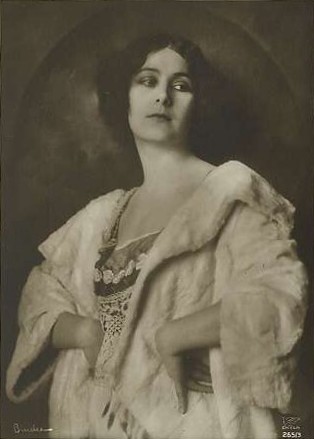
Lil Dagover was a German actress whose film career spanned between 1913 and 1979. She was one of the most popular and recognized film actresses in the Weimar Republic.
The term state actor has had different meanings in recent German history. In Nazi Germany, it was the highest title that could be awarded to a stage actor. Since 1945, the meaning has changed. In Baden-Württemberg, it is no longer simply a title of honor, but an official position.
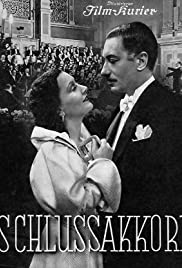
Schlußakkord is a German film melodrama of the Nazi period, the first melodrama directed by Detlef Sierck, who later had a career in Hollywood as Douglas Sirk and specialised in melodramas. It was made under contract for Universum Film AG (UFA), stars Lil Dagover and Willy Birgel and also features Maria von Tasnady, and premièred in 1936. It shows stylistic features later developed by Sierck/Sirk and makes symbolic and thematic use of music.
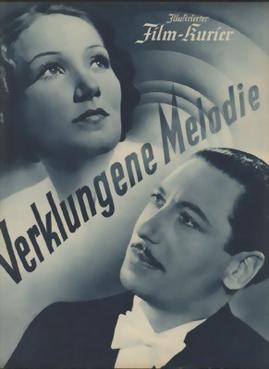
Faded Melody is a 1938 German drama film directed by Viktor Tourjansky and starring Brigitte Horney, Willy Birgel and Carl Raddatz. The film was made by Germany's largest studio of the era UFA. It was shot at the Babelsberg Studios in Potsdam and on location in French Algeria, New York City and Berlin. The film's sets were designed by the art directors Hermann Asmus and Max Mellin. It premiered at Berlin's Gloria-Palast.

I Need You is a 1944 German comedy film directed by Hans Schweikart and starring Marianne Hoppe, Willy Birgel and Paul Dahlke. The film's sets were designed by the art director Hans Sohnle.

Captain Wronski is a 1954 West German spy film directed by Ulrich Erfurth and starring Willy Birgel, Elisabeth Flickenschildt, and Antje Weisgerber. A Polish officer works undercover in 1930s Berlin to discover Nazi Germany's plans against his homeland.

Men Without a Fatherland is a 1937 German drama film directed by Herbert Maisch and starring Willy Fritsch, Maria von Tasnady and Willy Birgel.

Riding for Germany is a 1941 German drama film directed by Arthur Maria Rabenalt and starring Willy Birgel, Gertrud Eysoldt and Gerhild Weber. A German cavalry officer, badly injured during the First World War, emerges as a leading competitor in post-war equestrian events.

Triad is a 1938 German drama film directed by Hans Hinrich and starring Lil Dagover, Paul Hartmann and Rolf Moebius.

When the Evening Bells Ring is a 1951 West German drama film directed by Alfred Braun and starring Willy Birgel, Maria Holst and Paul Hörbiger. It was shot at the Tempelhof Studios in West Berlin with sets designed by the art director Gabriel Pellon. It is unrelated to the 1930 silent film of the same title.

Enemies is a 1940 German drama film directed by Viktor Tourjansky and starring Brigitte Horney, Willy Birgel and Reinhold Lütjohann. The film was a Nazi propaganda work, attacking Poland which Germany had invaded the year before. The film's sets were designed by Herbert Hochreiter, Alfred Metscher and Julius von Borsody.

The Copper also translated as The Grasper is a 1958 West German crime film directed by Eugen York and starring Hans Albers, Hansjörg Felmy and Susanne Cramer. It is a remake of the 1930 film The Copper which Albers had also starred in. It was shot at the Tempelhof Studios in West Berlin as well as on location in Hamburg and Essen. The film's sets were designed by the art directors Gabriel Pellon and Theo Zwierski.

Only a Dancing Girl is a 1926 German-Swedish silent drama film directed by Olof Molander and starring Lil Dagover, Walter Janssen and Harry Halm.

The Chaplain of San Lorenzo is a 1953 West German drama film directed by Gustav Ucicky and starring Willy Birgel, Dieter Borsche and Gertrud Kückelmann. It was shot at the Bavaria Studios in Munich. The film's sets were designed by the art directors Robert Herlth and Gottfried Will.

Between Time and Eternity is a 1956 West German-Spanish drama film directed by Arthur Maria Rabenalt and starring Lilli Palmer, Willy Birgel and Carlos Thompson. It was co-produced with Spain as part of a growing trend in European production.

The Bird Seller is a 1935 German musical comedy film directed by E. W. Emo and starring Maria Andergast, Wolf Albach-Retty, and Lil Dagover. It is an operetta film, based on the work of the same name by Carl Zeller.
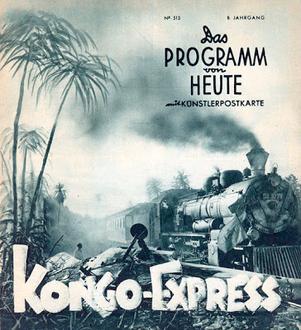
Congo Express is a 1939 German adventure film directed by Eduard von Borsody and starring Marianne Hoppe, Willy Birgel. and René Deltgen.
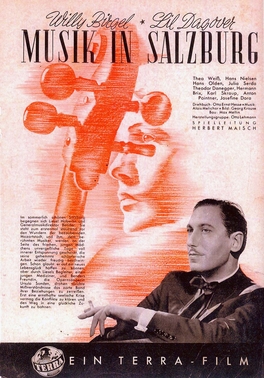
Music in Salzburg is a 1944 German comedy film directed by Herbert Maisch and starring Willy Birgel, Lil Dagover and Hans Nielsen.It was shot at the Babelsberg Studios in Berlin and on location around Salzburg. The film's sets were designed by the art director Max Mellin.

The Dancer of Sanssouci is a 1932 German historical drama film directed by Frederic Zelnik and starring Otto Gebühr, Lil Dagover, and Rosa Valetti. Set at the court of Frederick the Great, the film is part of a group of Prussian films made during the era. It portrays the interaction between Frederick and the celebrated dancer Barberina Campanini. Gebühr had previously appeared as Frederick in a silent film The Dancer Barberina about their relationship.



















